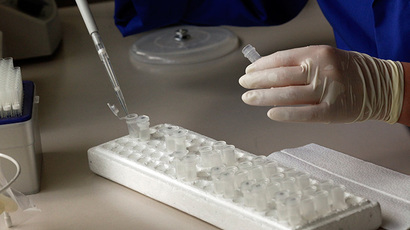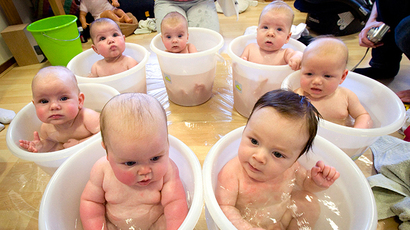Vegetarians have fewer, less-healthy sperm than meat-eaters – study

Vegetarian men may be harming their chances of conceiving children, a multi-year US study has revealed. Researchers believe the reasons may include vitamin deficiencies and the presence of female hormones in soy, which is popular among vegetarians.
Noting that Seventh-Day Adventists, members of a strict Protestant sect, live 10 years longer than average Americans, researchers at Loma Linda University, itself a Seventh-Day Adventist institution, hypothesized that diet was a possible reason. Many of the sect’s followers are encouraged to go vegetarian, as most meat is considered “unclean.”
For the experiment, researchers monitored 443 meat-eaters and 31 vegetarians and vegans between 2009 and 2013, initially assuming that the vegetarians’ sperm would be healthier, and a contributing factor to the longevity of their offspring.
But the results, to be published in Fertility and Sterility journal on Wednesday, came as a surprise.
“We found that diet does significantly affect sperm quality.
Vegetarian and vegan diets were associated with much lower sperm
counts than omnivorous diets,” said lead study author Eliza
Orzylowska. “Although these people are not infertile, it is
likely to play a factor in conception, particularly for couples
who are trying to conceive naturally, the old-fashioned way.”
Vegetarians had 30 percent lower concentrations of sperm – 50 million per milliliter, versus 70 million per milliliter. Their motility - the vitality of the sperm – was also lower, with a third of sperm active, versus 60 percent for the meat eaters. Significantly, vegans fared worst of all.
Orzylowska believes that the reason could be soy, which was shown in a study three years ago to shrink the sperm count. The reason is a high content of phyto-estrogen, which mimics a female hormone, and impedes sperm production.

“For children who have grown up with those kind of diets, it may have impacted on sperm quality from puberty,” said Orzylowska.
“It’s hard to tell people not to be vegetarians if they are trying to conceive, but I would caution against using soy, at least for 74 days beforehand, which is the time it takes for sperm to be replaced.”
A second potential explanation put forward by Orzylowska is the shortage of B12, a vitamin that helps to break down estrogen, thus maintaining a high sperm count. With its highest concentrations found in beef and fish, many vegetarians who do not take supplements may be missing out.
Another parallel, but independent, longitudinal study conducted by Harvard scientists and published by the American Society for Reproductive medicine this week has identified pesticides as a potential cause of reduced fertility among vegetarians.
Between 2007 and 2012 the scientists studied the sperm of 155 men at the Massachusetts General Hospital, measured how much fruit they consumed, and whether those fruit came from areas with a high level of pesticide residue.
The quarter of men who consumed the most fruit and vegetables with a high pesticide residue had a 70 percent smaller count of motile sperm, and 64 percent smaller count of normally-shaped sperm than the quarter of men who consumed the least pesticide-tainted fruit and vegetables.
“Men who want to optimize their reproductive health need to take care take care to choose fruits and vegetables grown with lower levels of pesticides, which are less contaminated. Nutrition is important to good reproductive health, but food that is good for you can contain other substances, not so good for you,” commented Paul J. Turek, president of the Society for Male Reproduction and Infertility.














